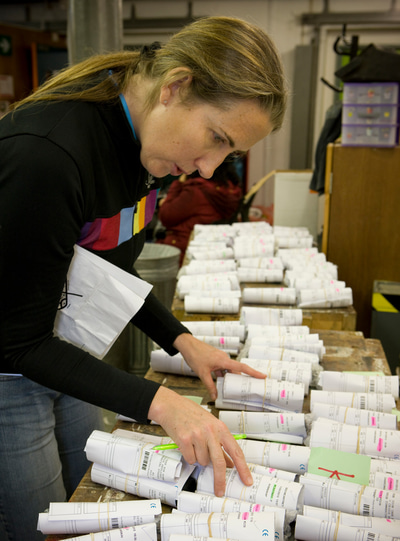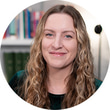- OT
- Life in practice
- Practitioner stories
- Helping to reduce eye health inequality
How I serve my community
Helping to reduce eye health inequality
Optometrist, Elaine Styles, shares her involvement with Vision Care for Homeless People and the lasting impact the charity has on the community

23 December 2022
OT spoke to optometrist, Elaine Styles, about her involvement and dedication to VCHP.
Can you share what you have been doing to help serve your community?
I have worked at the same High Street practice for nearly 30 years; we sometimes see three generations of the same families. The practice is an integral part of the community for delivering quality eye care and receives referrals from local GPs as well as existing patients. As well as routine eye examinations and contact lens fitting, we help with eye problems and often save someone having to go to hospital.Within VCHP, I am part of a large team of dedicated volunteers and a small team of committed staff who are helping to reduce the eye health inequality that homeless people face. VCHP has clinics in seven cities around the country and aim to preserve, protect, and promote the ocular health of homeless and vulnerable people in the UK who are unwilling or unable to access mainstream services available through the NHS. We include screening of ocular health and the provision of spectacles, that meets the immediate visual needs of our beneficiaries.
Why is this important and what made you want help others?
I am passionate about how important eye care is to a person’s health and wellbeing. It is a great way to screen for general health conditions such as diabetes or high blood pressure. Seeing clearly is essential.Having clear vision and healthy eyes is crucial for anyone, but imagine if you were homeless and could not see? Corrected vision is essential for confidence, skill building, accessing benefits, finding accommodation, finding work, or just surviving in a high-risk environment.
While still at school, I became aware that homelessness can affect anyone from any background. As a teenager, I had a friend who lived with his father and siblings. His father was one of the most intelligent and hardworking people I knew. His father started drinking more and this unfortunately resulted in him losing his job. This then led to them having problems in paying for their house and in the end, they were made homeless.
My friend was taken in by his grandparents and their father ended up on the streets. I used to see him sleeping on a bench in the local park. He was a very proud man and refused to seek help. It was many years before he took that step and got the rehabilitation he needed.

Is this initiative part of an organisation, charity, or something you have created through your relationships with your patients?
I first started working with homeless people back in 1997. I saw a small advert in an optical journal appealing for volunteers to carry out eye examinations at the Crisis Christmas and I signed up for two shifts. At the time it was a service that was offered by a single domiciliary practitioner. It was a fantastic experience being able to offer my time to people who were so desperately in need of help, so the next year I persuaded a couple of practice colleagues to also volunteer.The following year I took over the organisation of the Crisis Christmas optician’s service and from then on, each year I continued to expand the number of volunteers. I also asked manufacturers to loan equipment like a field screener and a slit lamp so we could provide an eye examination equivalent to a practice rather than a domiciliary style test.
Unfortunately, the service only ran from the 23 — 29 December each year. There was always a large queue of people waiting to be tested and as the 29th arrived people became more panicked about getting a test as it would potentially be another year before that could have a test again.
The Crisis Christmas service is an amazing organisation that has been running for over 40 years. It provides a huge range of services including food, clothing, medical, dental, optical, podiatry, physiotherapy, hairdressing, IT, housing and benefit advice, addiction and rehabilitation advice, laundry, sewing and dog care.
Discussions to form a charity to provide eye care to homeless and other vulnerable people started back in April 2003 between myself and three other optometrists, Harinder Paul, Mohan Vaithianathar and Edwin Achu. We wanted to provide optical services to homeless and other vulnerable people in an environment in which they feel comfortable. It took five months of organisation to find the equipment needed, the right location and the volunteers to run the clinic and in September 2003 VCHP was born.
What impact has this had on the community?
Thousands of people across the UK have benefited from eye care and glasses delivered by a dedicated and professional team. VCHP aims to meet the immediate visual needs of our beneficiaries in a safe, accessible, friendly, and comfortable environment.Is this an initiative set up in your practice or is it outside of your professional role? If in practice, how have patients responded?
The initiative has developed from my professional knowledge. Most people experiencing homelessness do not feel comfortable going into a High Street practice, so we need to take the service to them and are based in centres delivering other homeless services.My patients in practice are very supportive of the work of VCHP. Some of them have made donations or sponsored me in the various events I have carried out over the years. I have also made connections with patients who work or volunteer with local organisations and we can work together and support each other.
The smile on people’s faces when they collect their glasses and seeing clearly for the first time in years is a fantastic reward. I have seen people change and turn their lives around
Did your expertise and knowledge in optometry aid you in the initiative?
Yes definitely. It is my knowledge of how important essential eye care is that has driven my passion for trying to reduce the eye health inequality that homeless people face.
Do you have any anecdotes from people that have benefitted from the work carried out by VCHP that would you like to share?
The smile on people’s faces when they collect their glasses and seeing clearly for the first time in years is a fantastic reward. I have seen people turn their lives around. One gentleman came to pick up his new glasses and told us he had been trying to get a job but when he was asked to read something during a job interview, he couldn't see it properly and got flustered. He had also stopped using the internet to look for work because his eyes hurt so much using a computer.
He was very pleased with his new glasses and eagerly went off to his next appointment at the job centre. We heard from him again a few weeks later; he had got himself a job and is currently working full time as a kitchen porter in Chiswick.
What do you think this means to the people you help?
Providing a pair of glasses can provide a stepping stone to build their confidence and enable people to regain control of their lives, while simultaneously improving their self-esteem, confidence, accessing benefits, finding accommodation, finding work, or just survive in a high-risk environment.Homeless people are very vulnerable. They are at one of the lowest points of their life and are generally ignored by other people – for example, they appear invisible in the street with people just walking past them. When you spend time talking to someone, you can see the difference it makes to them to know that you care about them and their wellbeing.
What does the future hold for this project?
It is currently difficult to estimate the full future need for VCHP as the current tough financial situation is driving an increasing number of people into crisis. The aim of VCHP is to expand this service nationwide in all the major cities, to make a difference to as many homeless and vulnerable people as we can. We are actively working towards that.Interested in supporting VCHP? Elaine shares more…
We run clinics in seven cities across England so only meet a small percentage of the need for eye care for homeless and vulnerable people. Our vision is to ensure that 40% of homeless people in England are receiving eye care every two years. To go some way towards achieving that, we plan to open many new clinics in homeless persons day centres. You can come and volunteer in one of our clinics or start building a team to open a clinic in your town or city.
VCHP considers partnering with High Street optometry practices important to help people experiencing homelessness to progress to mainstream services and to reach areas where numbers are too few to justify an in-house service. They have developed different models of how partnerships with High Street optometry practices could operate. VCHP would like to test these models with potential partners like high street practices or domiciliary opticians.
To find out more about volunteering for VCHP in a clinical or administrative role, check out the website.
If you'd like to do some fundraising for us or wish to find out how you can support us in other ways, please get in touch.


Comments (0)
You must be logged in to join the discussion. Log in